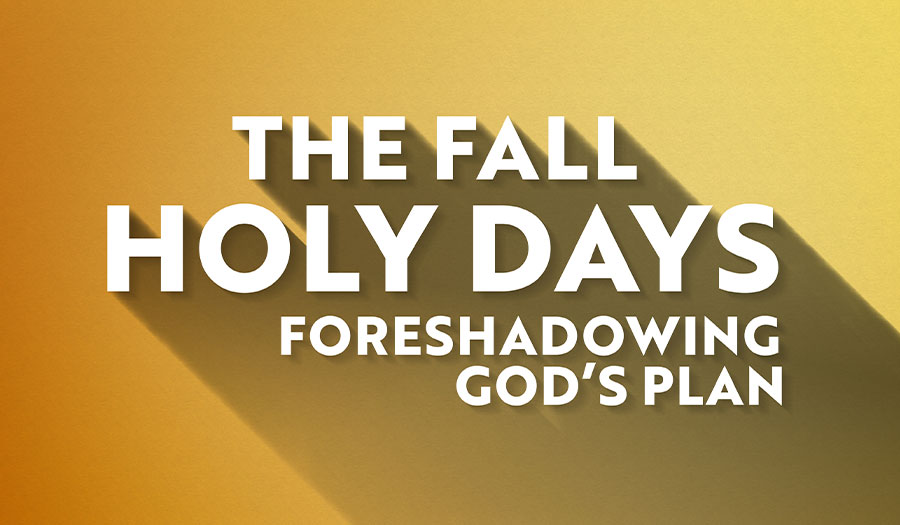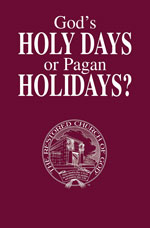 The Real Truth
The Real Truth
Article
The world feels like it is spinning out of control. But God’s Holy Days reveal where we are going—and how you fit in.
Learn the why behind the headlines.
Subscribe to the Real Truth for FREE news and analysis.
Subscribe NowDo you ever wonder what God is doing in the world? With so many wars and natural disasters and accelerating moral decline, it can be hard to see any divine plan at all. Everything can seem chaotic, even hopeless at times.
Yet God explains His plan for humanity in the pages of the Bible—in verses most skim past without realizing what they reveal. Long ago, He outlined that plan through a series of seven sacred observances called Holy Days in Leviticus 23. These are set times when He invites His people to understand His purpose, each with its own unique meaning.
The apostle Paul wrote, “Let no man therefore judge you…in respect of an holyday, or of the new moon, or of the sabbath days: which are a shadow of things to come; but the body is of Christ” (Col. 2:16-17).
Paul likens the Holy Days, among other observances, to a “shadow of things to come.” Just as a shadow outlines the form of something real, the Holy Days reveal some of the most powerful and hope-filled moments in God’s unfolding purpose.
The instruction to let no man judge you is sometimes quoted to claim Christians no longer need to keep the Holy Days. In reality, this passage teaches the exact opposite.
What does let no man judge you mean? First, look at the end of verse 17. In the King James Version, the passage ends with “but the body is of Christ.” Note that the word “is” appears in italics—meaning it was not in the original Greek text but was added by the translators. Without that added word, the phrase simply reads, “but the body of Christ.” Paul’s meaning becomes clear: Rather than outsiders or critics telling you how to keep these days, it is the Body of Christ—God’s Church—that should provide that guidance.
For 2,000 years, that Church has continued to teach and observe these days, showing their meaning directly from the Bible. In a world filled with conflicting ideas about this verse and the Holy Days themselves, God’s Church makes the meaning plain from His Word.
Contrary to popular belief, the Holy Days are not “Jewish” holidays. God calls them “the feasts of the Lord” (Lev. 23:2), and He intended them to be kept by all who worship Him, Israelite or not (Ex. 12:49). These days were never abolished. The early Church began on a Holy Day (Acts 2), and Gentile congregations faithfully kept them under the apostles’ leadership (Acts 20:6). God said they are to be kept forever, throughout all generations (Lev. 23:31).
The Spring Holy Days—Passover, the Days of Unleavened Bread and Pentecost—lay a foundation for understanding God’s purpose. They point back to world-changing events that have already taken place, revealing how God began the process of saving mankind step by step through His Son Jesus Christ’s life, death and resurrection, as well as the start of the New Testament Church.
These fulfilled milestones give context for what the Fall Holy Days foreshadow: the completion of the plan God started.
The Feast of Trumpets
The Feast of Trumpets is the first of the Fall Holy Days God commands His people to observe. Leviticus 23:24 says, “Speak unto the children of Israel, saying, In the seventh month, in the first day of the month, shall you have a Sabbath, a memorial of blowing of trumpets, an holy convocation.”
Throughout Scripture, the sound of trumpets signals major announcements from God. When He descended on Mount Sinai to give His Law, His arrival was marked by thunder, lightning and a piercing trumpet blast (Ex. 19:16). Trumpets were also blown at the beginning of the Jubilee year—a joyful time of liberty and restoration—as well as to accompany burnt offerings at the start of each month (Num. 10:10).
Prophecy shows dramatic blasts will be used again in the future. In the book of Revelation, seven trumpets herald end-time events, each announcing a stage of divine judgment during the Day of the Lord (Rev. 8-9). Jesus Himself said a great trumpet will sound at His Return: “And He shall send His angels with a great sound of a trumpet, and they shall gather together His elect from the four winds, from one end of heaven to the other” (Matt. 24:31). Here, the trumpet is not a warning but a call of victory.
Today, God’s people gather on the Feast of Trumpets to hear messages about this coming intervention in world affairs. The day is marked by awe of God’s power and anticipation of what He will soon do on Earth. The celebration reminds us that judgment is coming—but so is deliverance and lasting peace.
The Day of Atonement
Sin separates people from God. It is a barrier that must be removed before humanity can fully learn His Way in the Kingdom. The Day of Atonement points to the time when mankind will be reconciled to its Creator—when the whole world will be “at one” with Him.
Leviticus 23:27 says, “Also on the tenth day of this seventh month there shall be a day of atonement: it shall be an holy convocation unto you; and you shall afflict your souls, and offer an offering made by fire unto the Lord.” Unlike the other Holy Days, this one is not a feast, but a fast. To “afflict your soul” is a biblical expression for fasting. Read Isaiah 58:3. From sunset to sunset on the Day of Atonement, God’s people go without food and drink.
Fasting is an act of humility. It quiets the noise of daily life and reminds us that we are not self-sufficient. James wrote, “God resists the proud, but gives grace unto the humble. Submit yourselves therefore to God. Resist the devil, and he will flee from you. Draw near to God, and He will draw near to you” (4:6-8). When people humble themselves before Him, God responds with mercy.
In ancient Israel, the Day of Atonement was the only day each year when the high priest entered the Most Holy Place to make atonement for the people (Lev. 16:30). This foreshadowed Jesus Christ’s perfect atoning sacrifice, when He entered the heavenly temple with His own blood to obtain eternal redemption (Heb. 9:11-12). But for God’s Plan to move forward, Satan, as the driving force of human nature, must be removed.
The Bible calls the devil “the god of this world” (II Cor. 4:4) who “deceives the whole world” (Rev. 12:9). As long as he remains active, true peace cannot be established. Atonement points to the time when Satan will be bound and unable to influence the nations any longer (Rev. 20:2-3). Then, humanity will be free to live in harmony with God.
Today, God’s people keep the Day of Atonement as a yearly reminder of this coming freedom. It pictures a world no longer under the devil’s sway, where nothing will stand between mankind and its Creator.
The Feast of Tabernacles
Following the solemn Day of Atonement, God commands His people to rejoice. Deuteronomy 16:13 and 15 says, “You shall observe the feast of tabernacles seven days, after that you have gathered in your corn and your wine…because the Lord your God shall bless you in all your increase, and in all the works of your hands, therefore you shall surely rejoice.” Deuteronomy 14:23 adds that those who keep the Feast learn to fear God.
The Feast of Tabernacles pictures what life will be like during the Kingdom, when God will rule the nations and His Way will be taught to all. The Earth will be renewed. War, injustice and suffering will end. Humanity will finally experience life as God always intended—peaceful, productive and filled with joy.
God told ancient Israel to live in temporary shelters during the Feast (Lev. 23:42-43). This reminded them of their time in the wilderness, when they relied on Him for every need. This instruction also teaches a timeless truth: Our present lives are temporary. Paul compared our physical bodies to tabernacles—temporary dwellings that will one day be replaced with a permanent, eternal home (II Cor. 5:1).
The Feast points to the time when God’s people will receive eternal life, living and reigning with God in a transformed world. Isaiah foretold that “the earth shall be full of the knowledge of the Lord” (11:9), and Micah said people will “sit every man under his vine and under his fig tree; and none shall make them afraid” (4:4).
Today, God’s Church hosts the Feast of Tabernacles at locations around the world, where members hear daily messages about the coming Kingdom, enjoy uplifting fellowship and participate in wholesome activities. It is a time that strengthens each Christian’s walk with God.
The Last Great Day
A final Holy Day completes God’s Plan as pictured in the annual cycle. The Last Great Day powerfully illustrates His desire to offer salvation to every human being who has ever lived.
This observance comes immediately after the seven days of the Feast of Tabernacles. Leviticus 23:36 says, “On the eighth day shall be a holy convocation unto you…it is a solemn assembly.”
Thousands of years later, Christ revealed a deeper meaning of this day: “In the last day, that great day of the feast, Jesus stood and cried, saying, If any man thirst, let him come unto Me, and drink. He that believes on Me, as the scripture has said, out of his belly shall flow rivers of living water” (John 7:37-38). John explained, “This spoke He of the Spirit, which they that believe on Him should receive” (vs. 39). In the future, God’s Holy Spirit will be made freely available to everyone.
The Bible shows that God is “not willing that any should perish, but that all should come to repentance” (II Pet. 3:9). Those who never had the chance to know the true God will be raised to physical life and given that opportunity (Ezek. 37:12-14; Rev. 20:11-12). The same salvation now offered to the few called in this age (John 6:44) will be extended to multitudes from all nations and times.
Resurrected to physical life, people will finally understand God’s Word clearly, see His plan for themselves and choose whether to walk in His way.
Today, God’s people keep the Last Great Day as a reminder of this hope-filled future. It pictures the time when God’s offer of eternal life will reach every person who has ever lived.
Experience the Blessings Now
From the sounding of trumpets to the hope of a renewed world, God’s Holy Days reveal the most important story ever told—His plan to redeem humanity, restore Creation and freely offer eternal life to all.
More than just days about future events, they are designed to draw us closer to God now. Each one is filled with spiritual depth that can only be fully appreciated by keeping them.
Zechariah 14:16 describes a time in the Kingdom of God when all nations will go up “from year to year to worship the King, the Lord of hosts, and to keep the Feast of Tabernacles.” The Holy Days will be part of life in the wonderful world to come.
But you do not have to wait until then to take part. Today, God’s people keep these observances in the way He commands—gathering to hear sermons that bring His Plan to life, sharing meals and meaningful conversations, and spending focused time with family and fellow Christians. These moments refresh and inspire, strengthen bonds and give a foretaste of God’s soon-coming Kingdom.
To learn more, request your free copy of God’s Holy Days or Pagan Holidays? This resource explains each day in detail and shows how—and when—God says to keep them.



